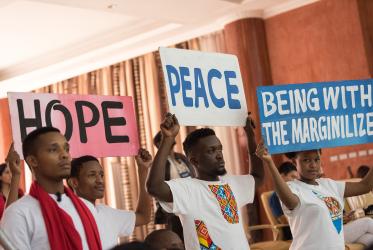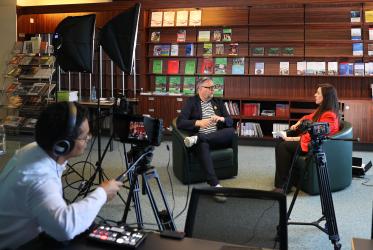A message from the Echos Commission on Youth in the Ecumenical Movement
9 October 2008
Voices of Youth in the Ecumenical Movement: Stronger and Better Heard. This is a goal towards which we, the Echos Commission on Youth in the Ecumenical Movement (World Council of Churches),1 are committed to work. Our group, consisting of 25 young adults from various continents, churches and organizations, assembled in Bangalore, India from 28 September to 10 October 2008, meeting for the second time since its creation. We were graciously hosted by the Student Christian Movement of India and the Ecumenical Christian Centre in Whitefield. Echos attempted to discern what actions it should take in order to help young adults utilize and develop their wisdom, experiences, and talents in the ecumenical movement. After two weeks of worship and prayer, Bible study and witness, dialogue, deliberation, and exposure to the local realities we release this "sound" to the oikomene from our gathering in Bangalore:
In local communities around the globe, young people are proclaiming Good News of Jesus Christ and fulfilling the Great Commission: they are students and theologians, parishioners and pastors, activists and community organizers. As the Echos Commission, we are representatives of many young co-journers who are daily participating in God's redemption of the world. We hope to lift up to the churches the pulse of this movement.
Young people increasingly experience and define ecumenism in terms of "issues". Echos focused thematically around mission, overcoming violence, and justice for marginalized communities such as the Dalits (oppressed people) and adivasis (indigenous people) of India. The Echos Commission resounds:
-
Mission: God's mission continues in the world today. Meeting in concert with WCC Commission on World Mission and Evangelism, the Echos Commission prays like Jesus taught his disciples: God's will, not ours, be done (c.f. Matthew 6:10). Further, we affirm plans for exploring the intersection of mission and power, and mission and overcoming violence, in a postmodern context as issues of particular concern to youth; we challenge the churches to be responsive to the products of such study.
-
Therefore, we promote the Edinburgh Centennial Mission Conference 2010 and participation in its study processes and youth pre-conference by young people.
-
-
Overcoming Violence: Young people commit themselves to the struggle to overcome violence in their communities. Often disproportionately the casualties of violent acts youth have a particular stake in these collective efforts. Even as we gathered, attacks against Dalits and Christians continued in the Orissa and Karnataka states of India. This violence is deplorable, and we call for just peace that protects the freedom of Christians and all those created in the image of God in a religiously plural nation.
-
Moreover, we encourage youth to mobilize for participation in the 2011 International Ecumenical Peace Convocation in Kingston, Jamaica and contributions to the Declarations for Just Peace.
-
-
Liberation for Dalit and adivasi communities: Christ calls for freedom and justice for all those who are oppressed (c.f. Luke 4:18-19). We respect the cultures of India and have experienced God in this place. As such, we believe that all systems that oppress must be challenged by people of faith. Having communed with members of the Student Christian Movement of India, and having encountered adivasi (indigenous) peoples' villages and Dalit (oppressed) communities, we uphold the humanity of these our brothers and sisters. Therefore, we call for equality of all people, especially Dalits and adivasis, and stand in solidarity with them in the struggle for justice.
The Echos Commission understands its charge from the WCC 9th Assembly to facilitate broader involvement of young people in the ecumenical movement. We commend at least 25% participation of young people in all ecumenical conferences and commissions. Beyond participation statistics we are committed to enhancing youth contributions within the WCC and the entire ecumenical movement. We especially commit ourselves to enhance collaboration, networking, and communication toward this end.
As young people, we join with Christian sisters and brothers of all ages who work and pray for the healing of the nations (c.f. Revelation 22:2). We pray especially that God would raise up young people who empower themselves and are empowered by others as agents of this transformation. With renewed faith, passion, and commitment, let us continue the intergenerational and collaborative work to which we have been calledin the churches and throughout the ecumenical movement.
Deus te abençoe. Deus te proteja. Deus te dê a paz. Deus te dê a paz.
(May God bless you. May God protect you. May God give you peace. May God give you peace.)
---
In an effort to connect youth in the ecumenical movement, we invite youth leaders and organizations throughout the churches to contribute to an Ecumenical Youth Directory. Information about these entities may be submitted by email.
1 Echos (Greek Hχος: "sound") references the Biblical theme to call forth prophecy, celebration, and proclamation (c.f. Luke 3:4; Jeremiah 4:5; Hebrews 12:19). As such, we are called to respond to the "echos" from the past of those ecumenical leaders―young and old―who have gone before us. We must also lay the groundwork for the youth that will come after this generation. So we hope to send our voices as "echos" into the future.





